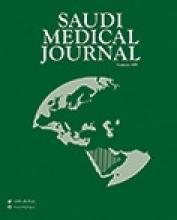Research ArticleOriginal Article
Open Access
The prognostic significance of p63 cytoplasmic expression in colorectal cancer
An immunohistochemical study
Abdulkader M. Albasri, Mohammed A. Elkablawy, Irfan A. Ansari, Ahmed S. Alhujaily and Amal A. Khalil
Saudi Medical Journal May 2019, 40 (5) 432-439; DOI: https://doi.org/10.15537/smj.2019.5.24162
Abdulkader M. Albasri
From the Department of Pathology (Albasri, Elkablawy, Ansari), Faculty of Medicine (Khalil), Taibah University; from the Department of Pathology (Alhujaily), King Fahad Hospital, Al-Madinah Al-Munawwarah, Kingdom of Saudi Arabia; and from the Department of Pathology (Elkablawy), Menofia University, Menofia, Egypt
MBBCH, PhDMohammed A. Elkablawy
From the Department of Pathology (Albasri, Elkablawy, Ansari), Faculty of Medicine (Khalil), Taibah University; from the Department of Pathology (Alhujaily), King Fahad Hospital, Al-Madinah Al-Munawwarah, Kingdom of Saudi Arabia; and from the Department of Pathology (Elkablawy), Menofia University, Menofia, Egypt
MSc, PhDIrfan A. Ansari
From the Department of Pathology (Albasri, Elkablawy, Ansari), Faculty of Medicine (Khalil), Taibah University; from the Department of Pathology (Alhujaily), King Fahad Hospital, Al-Madinah Al-Munawwarah, Kingdom of Saudi Arabia; and from the Department of Pathology (Elkablawy), Menofia University, Menofia, Egypt
MBBS, MDAhmed S. Alhujaily
From the Department of Pathology (Albasri, Elkablawy, Ansari), Faculty of Medicine (Khalil), Taibah University; from the Department of Pathology (Alhujaily), King Fahad Hospital, Al-Madinah Al-Munawwarah, Kingdom of Saudi Arabia; and from the Department of Pathology (Elkablawy), Menofia University, Menofia, Egypt
MBBCH, KSUFPAmal A. Khalil
From the Department of Pathology (Albasri, Elkablawy, Ansari), Faculty of Medicine (Khalil), Taibah University; from the Department of Pathology (Alhujaily), King Fahad Hospital, Al-Madinah Al-Munawwarah, Kingdom of Saudi Arabia; and from the Department of Pathology (Elkablawy), Menofia University, Menofia, Egypt
MBBCH
References
- ↵
- Ferlay J,
- Soerjomataram I,
- Ervik M,
- Dikshit R,
- Eser S,
- Mathers C,
- et al.
- ↵
- Bray F,
- Ren JS,
- Masuyer E,
- Ferlay J
- ↵
- Ibrahim EM,
- Zeeneldin AA,
- El-Khodary TR,
- Al-Gahmi AM,
- Bin Sadiq BM
- ↵Saudi Health Council. Annual Cancer Incidence Report for Saudi Cancer Registry (SCR), Available from https://nhic.gov.sa/eServices/Documents/2014.pdf. (Updated 2014; Accessed 2018 November 11).
- ↵
- Albasri A,
- Yosef H,
- Hussainy AS,
- Sultan SA,
- Alhujaily A
- ↵
- ↵
- ↵
- Massion PP,
- Taflan PM,
- Jamshedur Rahman SM,
- Yildiz P,
- Shyr Y,
- Edgerton ME,
- et al.
- ↵
- Reis-Filho JS,
- Simpson PT,
- Martins A,
- Preto A,
- Gärtner F,
- Schmitt FC
- ↵
- ↵
- ↵
- Guo HQ,
- Huang GL,
- Liu OF,
- Liu YY,
- Yao ZH,
- Yao SN,
- et al.
- ↵
- ↵
- ↵
- Albasri AM,
- Elkablawy MA,
- Hussainy AS,
- Yousif HM,
- Alhujaily AS
- ↵
- Ye S,
- Lee KB,
- Park MH,
- Lee JS,
- Kim SM
- ↵
- Fabbro M,
- Henderson BR
- ↵
- ↵
- Prall F,
- Hühns M
- Inoue T,
- Stuart J,
- Leno R,
- Maki CG
- ↵
- Narahashi T,
- Niki T,
- Wang T,
- Goto A,
- Matsubara D,
- Funata N,
- et al.
- ↵
- Dhillon PK,
- Barry M,
- Stampfer MJ,
- Perner S,
- Fiorentino M,
- Fornari A,
- et al.
- ↵
- ↵
- ↵
- ↵
- Agilent Dako
- ↵
- Glickman JN,
- Yang A,
- Shahsafaei A,
- McKeon F,
- Odze RD
- ↵
- ↵
- Ribeiro-Silva A,
- ZambelliRamalho LN,
- Britto Garcia S,
- Zucoloto S
- Wang BY,
- Gil J,
- Kaufman D,
- Gan L,
- Kohtz DS,
- Burstein DE
- ↵
- Xia W,
- Chen JS,
- Zhou X,
- Sun PR,
- Lee DF,
- Liao Y,
- Zhou BP,
- Hung MC
- ↵
- ↵
- Melling N,
- Kowitz CM,
- Simon R,
- Bokemeyer C,
- Terracciano L,
- Sauter G,
- Izbicki JR,
- Marx AH
- ↵
- Andreyev HJ,
- Norman AR,
- Cunningham D,
- Oates J,
- Dix BR,
- Iacopetta BJ,
- Young J,
- Walsh T,
- Ward R,
- Hawkins N,
- et al.
- ↵
- Shen B,
- Li M,
- Wang H,
- Xin L,
- Xie J
- ↵
In this issue
The prognostic significance of p63 cytoplasmic expression in colorectal cancer
Abdulkader M. Albasri, Mohammed A. Elkablawy, Irfan A. Ansari, Ahmed S. Alhujaily, Amal A. Khalil
Saudi Medical Journal May 2019, 40 (5) 432-439; DOI: 10.15537/smj.2019.5.24162
Jump to section
Related Articles
- No related articles found.
Cited By...
- No citing articles found.





